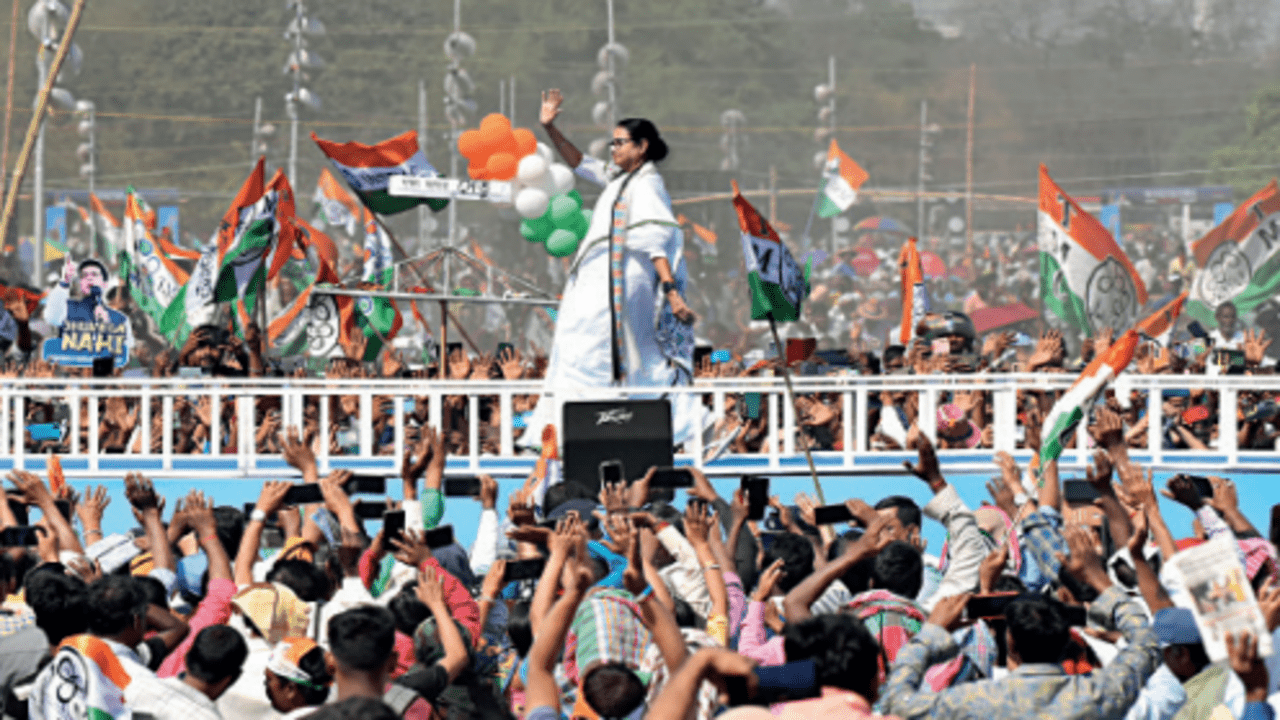
Strategic moves, welfare schemes and minority consolidation help TMC seal huge win
Don't Miss
PTI, Kolkata, Jun 5, 2024 : The TMC's victory in the 2024 Lok Sabha elections in West Bengal was facilitated by strategic manoeuvring, welfare schemes, consolidation of minority support and division of votes.
The result solidified the party's hold over the state ahead of the assembly polls to be held two years later.
Three years after halting the BJP's advancement in the state in the assembly election, the TMC coasted to another memorable victory in parliamentary elections, defying exit-poll predictions, securing triumph in 29 out of 42 Lok Sabha seats in West Bengal.
Despite facing numerous challenges including internal conflicts and scandals such as the school jobs scam and the Sandeshkhali issue which threatened the party’s image, the Trinamool Congress (TMC) secured a striking victory.
Apart from strategic manoeuvring and minority consolidation, the TMC leaders attributed a critical factor in its success to welfare schemes targeting women like 'Lakshmir Bhandar' and 'Kanyashree', pivotal in securing support from female voters, which compromise 50 per cent of the state electorate, and mitigating the repercussions of corruption allegations while bolstering grassroots backing.
“The people of Bengal restored faith in the developmental politics of the state government. The schemes aimed at the women of the state yielded positive results for us,” TMC MP Sougata Roy, who got elected for the fourth term, told PTI.
Out of the 29 newly TMC MPs, 11 are women which make up 38 per cent of the total party representatives in Lok Sabha.
According to a TMC leader, with the BJP’s tally going down both at the state and its government at the Centre likely to be dependent on allies, “the TMC will further solidify its stronghold over Bengal ahead of the assembly polls in 2026.
A significant aspect of the TMC's success was its strategic electoral manoeuvring. The breakdown of seat-sharing talks between the TMC and the Congress in January worked to the TMC’s advantage, setting the stage for a three-cornered contest.
This fragmentation of opposition votes allowed the TMC to consolidate nearly 30 per cent of the minority and anti-BJP votes, which proved decisive in many constituencies.
According to TMC leader Santanu Sen, the breakdown of the alliance enabled the party to emerge as the strongest alternative to the BJP in the state.
"The Left and the Congress were decimated. But as we emerged as the strongest alternative to the BJP in the state, we won even in seats which were considered BJP strongholds," Sen said.
This strategic positioning helped the TMC capture votes that might have otherwise gone to the fragmented opposition.
Local issues like the cancellation of school jobs, and the contentious implementation of the Citizenship Amendment Act (CAA), significantly reshaped election dynamics as the BJP's propagation of corruption allegations failed to resonate with voters, while the CAA, intended as a BJP electoral strategy, unexpectedly prompted minorities previously undecided between the TMC and the Left-Congress alliance to consolidate behind the Trinamool Congress.
“Once the tainted leaders including Partha Chatterjee, Sahajahan Sheikh, Jyotipriyo Mullick were put behind bars, the allegations of corruption subsided and took the winds away from the corruption narrative of the BJP,” political analyst Maidul Islam said.
Mamata Banerjee’s comments against certain sections of the Ramakrishna Mission and Bharat Sevashram Sangha, and the OBC reservation issue, where the Calcutta High Court recently struck down the OBC status of several classes including 77 Muslim communities, helped solidify the TMC's minority support base.
People belonging to the minority community helped TMC sweep Muslim-majority pockets in the southern region of West Bengal while the division of their votes facilitated BJP's victories in the northern part of the state, political analysts said.
Several parliamentary seats in both north and south Bengal, such as Raiganj, Cooch Behar, Balurghat, Malda North, Malda South, Murshidabad, Diamond Harbour, Uluberia, Howrah, Birbhum, Kanthi, Tamluk, Mathurapur and Joynagar, have significant Muslim populations.
The BJP retained Balurghat, Raiganj and Malda North, riding on the division of minority votes between the Left-Congress combine and the TMC, an analyst said.
"In south Bengal, the TMC, as expected, performed well in minority belts. But in some seats in north Bengal, the party faced tough competition from the Left-Congress alliance for a bigger pie of the minority votes," Political analyst Biswanath Chakraborty said.
Although these issues intensified communal polarization, they also helped the TMC reach out to liberal and elite Bengalis who had been drifting towards the Left and Congress.
“These issues also helped the TMC reach the 2-3 per cent Bengali elite and liberals, which just like 2021 in 2024 helped the TMC in the fight against the BJP,” Islam said.
The Trinamool Congress registered a 45.77 per cent vote share in the 2024 Lok Sabha polls in West Bengal, up by more than two per cent from the 43.7 per cent of votes it received in 2019.
The BJP, on the other hand, registered a vote share of 38.73 per cent in the state this time around which, also unlike what the pollsters had predicted, was down by over two per cent compared to the 40.6 per cent votes it received five years ago.


0 Response to "Strategic moves, welfare schemes and minority consolidation help TMC seal huge win"
Post a Comment
Disclaimer Note:
The views expressed in the articles published here are solely those of the author and do not necessarily reflect the official policy, position, or perspective of Kalimpong News or KalimNews. Kalimpong News and KalimNews disclaim all liability for the published or posted articles, news, and information and assume no responsibility for the accuracy or validity of the content.
Kalimpong News is a non-profit online news platform managed by KalimNews and operated under the Kalimpong Press Club.
Comment Policy:
We encourage respectful and constructive discussions. Please ensure decency while commenting and register with your email ID to participate.
Note: only a member of this blog may post a comment.